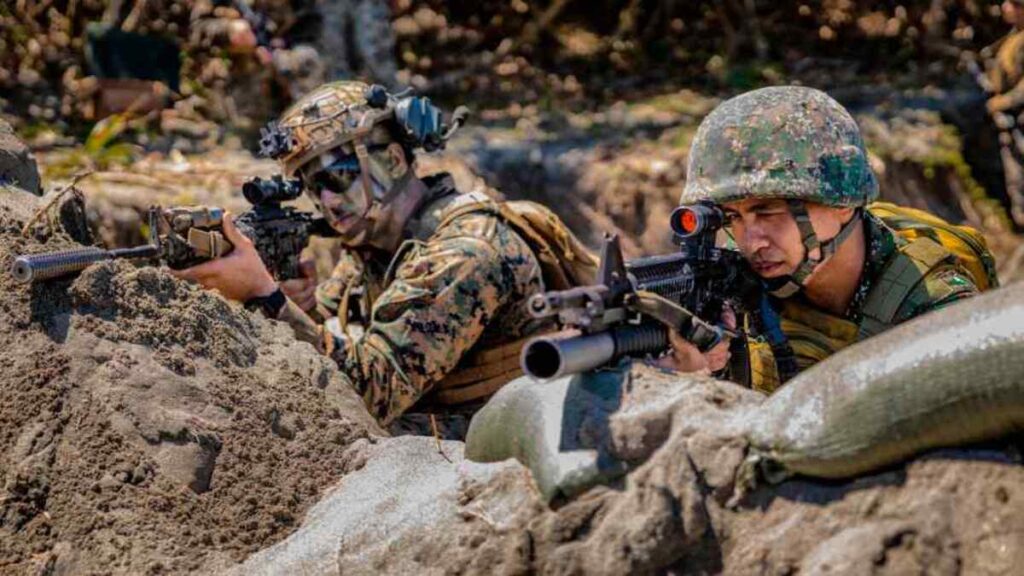
As Manila begins to examine its position in a hypothetical battle with China over Taiwan, the Philippines and the US are strengthening their military cooperation, notably by doubling the number of troops participating in joint exercises next year.
According to Colonel Michael Logico, head of the Philippine military’s Joint and Combined Training Center, which recently convened a planning conference with US counterparts, the US and Philippines would send 16,000 personnel to Balikatan, their largest yearly bilateral military exercise, next year.
“We are going to do a full battle test for operating together, including in Northern Luzon” near the country’s sea border with Taiwan, Logico said in an interview with the Financial Times.
Military commanders will discuss more than 500 bilateral activities for the upcoming year at the annual bilateral defense talks, which will be hosted by US Indo-Pacific Command in Hawaii next week. This is an increase from about 300 bilateral activities this year.
According to two persons familiar with the meeting, US Defense Secretary Lloyd Austin and Filipino Defense Minister Jose Faustino Jr. will meet on Thursday. This will be the first time defense ministers from the allies will participate in the negotiations.
The increased cooperation comes after senior Filipino officials expressed concern over China’s escalating military action near Taiwan and supported strengthening the nation’s alliance with the US, which was undermined when then-president Rodrigo Duterte attempted a pivot to China in 2016.
In a meeting with President Ferdinand Marcos Jr. this week in New York, Joe Biden stated that the two countries’ relationship had “extremely deep roots.”
“We’ve had some rocky times, but the fact is it’s a critical, critical relationship, from our perspective,” the US president said. “I hope you feel the same way.”
Gregory Poling, a south-east Asia expert at CSIS, a Washington think-tank, said there was “a growing recognition of the role of the Philippines in a Taiwan scenario”.
“You’re starting to see a consensus emerge within most of the Philippines’ government that the Philippines does need to deepen the alliance with the US,” Poling said.
Concerns about the dangers that a Chinese strike on Taiwan would pose for other US allies have also intensified. Japan and the US have recently increased their planning, preparation, and training for such a situation.
“We are a US ally, we are in a strategic location. We are so near that if anything happens in Taiwan we will be involved,” said General Emmanuel Bautista, former chief of staff of the armed forces of the Philippines.
Bautista said the Philippines was “key terrain” for US-China competition because control of the nation could give either side a significant advantage over its rival. He pointed to waterways that pass through the Philippines and connect the South China Sea and the Pacific, such as the Sibutu Passage in the south and the Bashi Channel in the north.
In the second world war, according to Bautista, navies used water passages around the Philippines to acquire essential access for naval battles.
“Either China or the US will want to seize the Philippines to be able to control the chokepoints and the access to Taiwan” in the event of a conflict, Bautista added. “For the US it’s access for resupplying Taiwan, for China preventing that.”
One concentration is on the islands in the Bashi Channel, which are only 120 kilometers north of Taiwan.
Manila is “wary of getting entangled in the center of rising US-China competition,” according to Lisa Curtis, an Indo-Pacific researcher at the CNAS think tank in Washington, but the new Marcos administration looked realistic about what Washington may demand in the event of a Taiwan confrontation.
“Washington would almost certainly look to Manila as a staging ground for logistics support and US forces. That is why it is important for the US and the Philippines to advance talks on the Enhanced Defense Cooperation Agreement,” said Curtis, in a reference to the 2014 bilateral agreement whose implementation has significantly slowed in recent years.
When the two nations said in November that they would look into other locations where US forces would be permitted a rotational presence, it was believed by analysts that this meant US forces would have access to bases on those islands.
The military’s swift defeat of a Chinese company’s effort to seize control of Fuga Island, which is north of Luzon, for a development project in 2019 caused the armed forces to concentrate more on the north, according to Logico.
“The Chinese have no use for Fuga. It really is about Taiwan, to deny us, and in extension the US, the use of those islands,” Logico added.
According to some current and past military officials from the Philippines, the Philippines would be the best route for US forces to replenish Taiwan with weapons during a conflict. Two persons in Manila who are acquainted with the situation say that US and Filipino military have begun discussing possible solutions.